One of the most important decisions you’re likely to make when developing a game is which tools will you use to build it.
Such as choosing a game engine, for example.
However, if you’re a beginner, deciding which engine to build your game in can be tricky, as there are many different options available, and each has its own strengths and weaknesses.
Which makes understanding the differences between different game engines, and choosing one that’s right for your project, extremely important, particularly if you’re going to spend time and energy learning how to use it.
In this article, Yuriy Denisyuk from Pingle Studio explains the differences between two of the most popular game engines for independent developers, Unity and Godot.
You’ll learn what each engine is good at, what it’s not, and which one is right for you, specifically, based on your experience and the game you’re trying to make.
Here’s what you’ll find on this page:
- Why would you use Godot?
- What games have been made with Godot?
- Why wouldn’t you use Godot?
- How is Godot different from Unity?
- Is Godot better than Unity for 2D games?
- Is Godot better for 3D than Unity?
- Is Godot better for mobile games than Unity?
- Is Godot better for multiplayer games than Unity?
- Is Godot slower than Unity?
- How will Godot 4 be different from Godot?
- Which engine is best for beginners?
Switching to Godot, from Unity
For an idea of what it’s like to switch from Unity to Godot try my first impressions video, or continue to the full article below.
Over to you, Yuriy…
Should you use Unity or Godot for your first game?
Unity is probably the most well-known engine in the game development world.
First released in 2005, it’s become a hugely popular solution for professionals and beginners alike, and has been used to build a huge number of outstanding games on PC, games consoles and mobile platforms.
Godot, on the other hand, while still a relatively new engine, having been released in 2014, has quickly gained in popularity and now is considered to be the 4th most popular game engine on the market and is a great, beginner-friendly solution for indie games.
But which is right for you?
You’ve probably already heard of Unity, and you will have definitely played a game that was built with it.
So why might you use Godot instead?
Why would you use Godot?
One of the biggest perks of Godot is that it’s open-source.
Which, if you’re comfortable with programming, can provide a huge amount of control over your project, as it means every element of your game’s code is accessible.
What’s more, Godot supports a number of common programming languages for games, such as C++, C#, and GDScript, Godot’s built-in scripting language, which was designed as a combination of two widespread and well-tested languages, Lua and Python.
Designed to be easy to pick up, GDScript is as readable as Python but includes features that are beneficial for game development, such as straightforward speed optimization, strict typing, and editor integration.
And if you aren’t familiar with programming languages, there’s no need to worry.
Godot also has a node-based interface, which makes it accessible even for beginners, that consists of different blocks (nodes and scenes) that you can drag and drop to structure your games in any way you want.
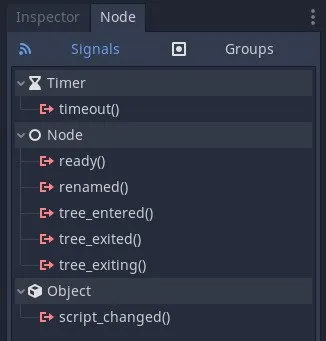
Godot features an accessible node-based interface.
What games have been made with Godot?
Since Godot is younger than Unity, it doesn’t have the same track record of well-known games in its portfolio.
However, Godot has been used to create many successful and notable games, such as:
- Kingdoms of the Dump by Roach Games;
- Cruelty Squad by Consumer Softproducts;
- Rogue State Revolution by Little Red Dog Games;
- Dungeondraft by Megasploot.
Godot is easy to use, easy to pick up and easy to customise as, if you want to see new features in the engine, you can simply create and implement them yourself.
But, while Godot can be very versatile, it might not be the best option for certain types of game.
So, when wouldn’t you want to use Godot?
Why wouldn’t you use Godot?
Although Godot is an extremely promising engine, it has its flaws.
And while some of them might not be a problem for you, others could have a big impact on whether Godot is right for you or not.
One of Godot’s biggest drawbacks is that it’s not the ideal solution for games with complex 3D graphics.
This is because, at the moment at least, it simply cannot provide the same level of powerful rendering that other engines, such as Unity and Unreal, can offer.
Other drawbacks include less-than-perfect level design tools and, because Godot is an open-source engine, no built-in support for console development.
Which, if you were planning to release your game on Switch or Playstation, might be a reason to avoid Godot for now.
This is because console software development kits are confidential, meaning that it’s not possible to include their code in the open-source Godot engine.
And while it is still possible to port a game that was built using Godot to console platforms, chances are you’ll need to hire an external company to help you do it.
Godot’s current build also lacks several other features that might be important to you, depending on what it is you’re trying to make.
For instance, it doesn’t have a built-in sprite editor and it cannot integrate third-party libraries as quickly and smoothly as possible.
There’s also a lack of particle attractors and occlusion culling, which might be a problem if you want to build visually demanding games.
Lastly, the Godot community is, for now at least, relatively small which, if you’re a beginner, can be a problem.
A smaller user base generally means fewer resources for solving problems.
Which can make Godot harder to learn.
However… as it turns out, that may not be a problem.
How is Godot different from Unity?
One difference between Godot and Unity is that Godot is, generally, considered to be more beginner-friendly.
While both platforms are relatively straightforward to get started with, if you don’t have much experience with programming or game development in general, it can be easier for you to start working with Godot.
Its node-based interface is great for those who are new to coding and it can be a good option for building simple games.
If, however, you already have some experience making games and you want to create more complicated projects with complex graphics, Unity might be a better option for you.
There can be more to learn when using Unity but, this is due, in part, to its larger feature set.
So just how do the features of each engine compare, and which is better for what?
Is Godot better than Unity for 2D games?
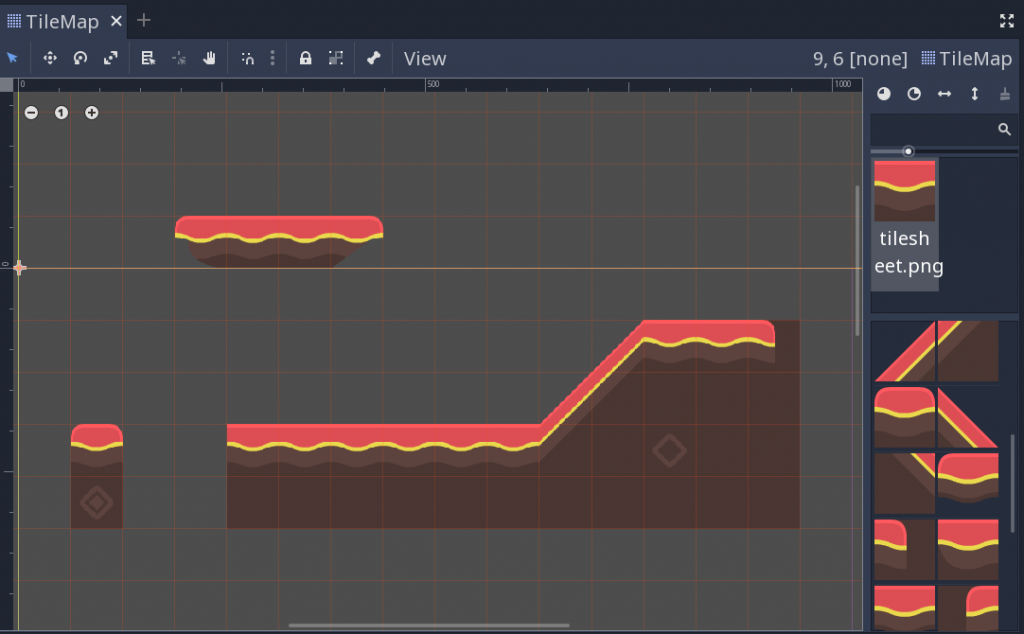
Source © Copyright 2014-2022, Juan Linietsky, Ariel Manzur and the Godot community (CC-BY 3.0).
That’s a tough question.
Being an older, more agile, and polished tool, Unity is generally better in terms of graphical features, as Unity have been working on their visual tools for years.
As a result, Unity performs well in terms of shading, color, light, and animation.
So if we compare Godot’s 2D features against Unity’s 2D features, in terms of just visuals, Unity is better.
On the other hand, while Godot has a dedicated 2D engine, Unity provides features that allow 2D development using what is, essentially, a 3D engine.
However, the difference isn’t significant and, generally speaking, which engine is better for 2D will depend on what you want to do with it.
Unity’s larger set of features means that there’s more to learn while, although Godot’s 2D shading and physics still need improvement the engine is generally easier to master.
Meaning that, despite lacking some features, Godot could still be a great solution for less complex projects.
So, while Unity offers more polished 2D options, Godot is still enough to create smart 2D games and can be easier to master.
Is Godot better for 3D than Unity?
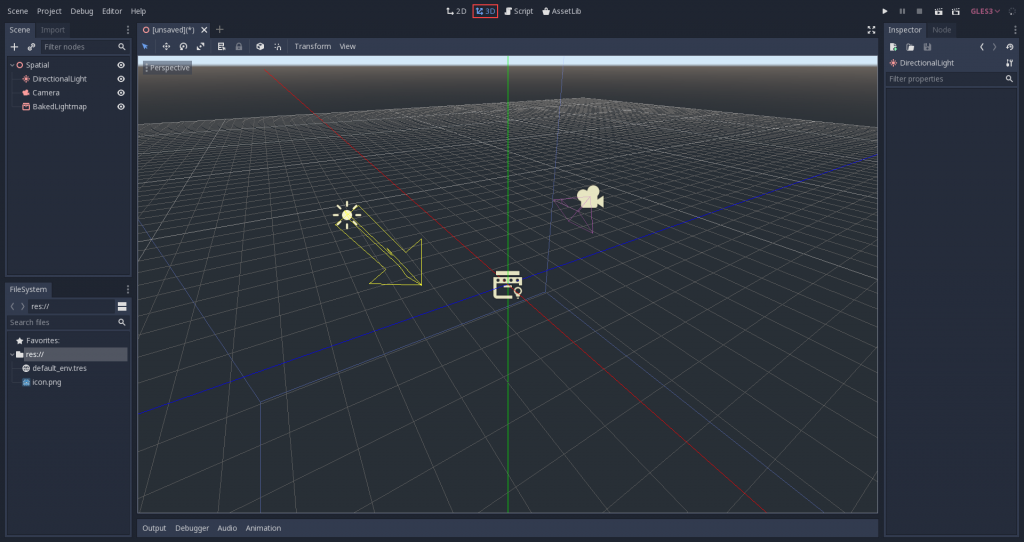
Source © Copyright 2014-2022, Juan Linietsky, Ariel Manzur and the Godot community (CC-BY 3.0).
When it comes to comparing Godot’s 3D performance with Unity’s, the answer is much simpler.
One of Unity’s biggest strengths is that, unlike Godot, it delivers outstanding results in 3D graphics creation and rendering.
In fact, Unity is one of the top engines for building complex games with rich 3D visuals.
So, despite Godot working hard to catch up with its 3D features, at the moment they’re not as good as Unity. Godot’s 3D engine simply isn’t optimized enough to render complex 3D game worlds.
But what if you’re not making a massive 3D world, what if you’re just trying to make a straightforward mobile game?
Is Godot better for mobile games than Unity?
Unity has been used to power a huge number of mobile games. 53%of the 1,000 top-grossing mobile games globally are powered by Unity (source).
However…
While Unity is more powerful, you might want to consider Godot for building your first mobile game.
Why?
Because Godot can be quicker to learn and can be more usable than Unity, meaning that, depending on your experience, you may be able to make a simple game faster with Godot than if you were to do it in Unity.
And while it’s true that Unity offers more options, you might not need those extra features while creating a simple 2D project or a mobile game.
So the choice is up to you.
You can either master Godot, which can be quicker and will help you to build your game faster and more easily.
Or you can start working with Unity, which can be a more complicated option but at the same time will prepare you for building more complex games in the future.
Is Godot better for multiplayer games than Unity?
Generally speaking, while both engines support network multiplayer, it’s easier to set up in Unity.
This is because, while Godot has a multiplayer API, which allows developers to set up multiplayer communications on a server, Unity provides users with a comprehensive multiplayer service.
This means that they provide network multiplayer as a complete service, servers included, which can be more reliable than trying to do it yourself.
Is Godot slower than Unity?
Unity is generally faster and more powerful than Godot, given that it’s an engine created for professional and complex game development, it has to deliver great results, quick rendering, and outstanding performance, and it does.
In comparison, Godot can be slower but, if you are a beginner, making your first game, raw performance may not be as important to you as ease of use, Godot’s simpler interface and the time required to master the basics of the engine.
In the end, it all depends on the complexity of the game you intend to build.
If your future projects are going to be huge, it’s better and safer to opt for a more stable, powerful solution like Unity.
However, if you just want to get an idea of what game development is like, Godot could can still do that for you, while being easier to figure out.
How will Godot 4 be different from Godot?
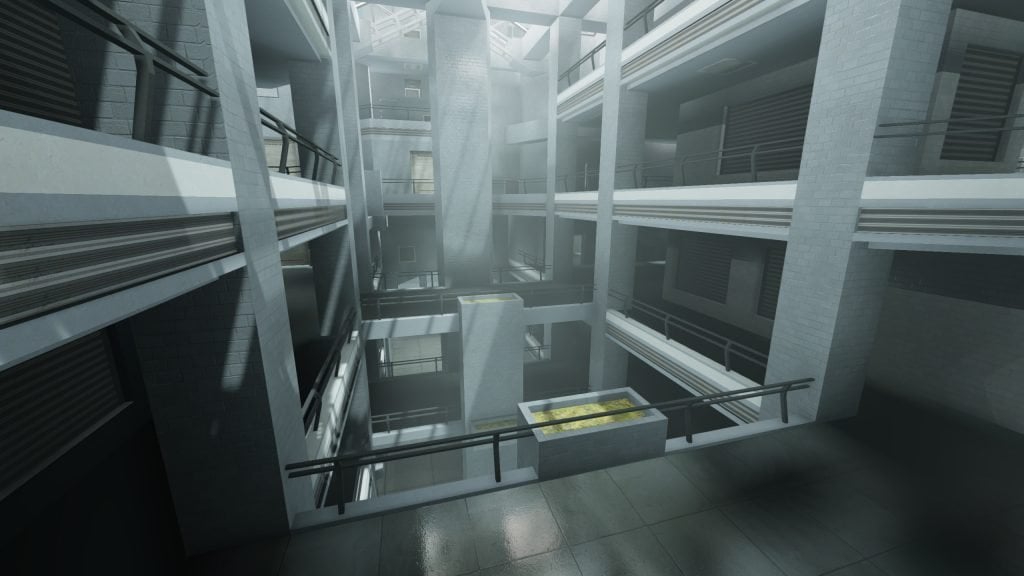
Source – Godot 4’s rendering engine has received a massive overhaul.
Godot 4 is a long-awaited new version of the engine.
The alpha release, launched at the beginning of 2022, focussed on improving the 3D development process and, following a complete rendering overhaul, means that 3D development in Godot is now more advanced than it has ever been.
New features have been added to help improve the fidelity of 3D scenes, it’s now possible to create complex dynamic effects by writing custom shaders operating on nodes, and the nodes themselves have been improved by Godot’s development team, making the process of configuring characters much simpler.
Both the visual shaders and the shading languages also have become more versatile and accessible.
Scripting has improved too.
While GDScript generally had been popular among Godot users (it is in fact the most used language of the ones available), the developers have still worked hard to make scripting in Godot even more pleasant.
Godot engine 4 introduces a list of long-awaited features, such as new property syntax, typed arrays, and built-in annotations to make the language even clearer.
It is also possible to automatically generate documentation with the help of scripts. This documentation can later be studied with the built-in help tool and the Inspector dock tooltips.
Godot 4 has improved in terms of localization as well. While support for Cyrillic or Latin characters has never been an issue before, the new update also makes it easier to render East Asian logograms, or Arabic scripts.
Object importing, multiplayer support, and general usability have all been improved in the alpha release, however, there are still more updates to come, as well as some bugs to fix.
And in the meantime, it’s still possible to build new amazing games while using the same old Godot 3 as, although the team is working to make future Godot 4 alpha releases better and better, the previous version of the engine still gets its own fixes and support.
Which engine is best for beginners?
So, is Godot a better option than Unity for game development?
Generally speaking, for most projects Unity is likely to be the better option.
If you want to work with a more stable, high-quality engine that allows you to create complex games with detailed 3D graphics, Unity would be the best option. It will enable you to build a top-class commercial project, offering you all the opportunities you need — amazing graphics, audio, and many more.
However, Godot can be easier to learn and, for beginners who want to try game development for the first time, the open-source engine might be perfect for building a great first project.
It’s completely free and easier to master than Unity. And, although Godot’s community is still relatively small, they are active and very eager to help you understand how to work with the engine. What’s more, the tool’s creators are also actively working on delivering the next, more versatile and competitive version of the engine.
Meaning that, in the future, Godot could easily become a serious competitor to more professional game development engines such as Unity.
In the end, there is no right or wrong choice.
Unity is a fully-featured, professional game engine, that can be used to create complex, commercially successful games. With a string of successful projects in its portfolio, Unity manages to strike a balance between professional feature sets and accessibility, bringing commercial tools within reach of beginner developers.
In comparison, Godot offers less in terms of features, but potentially more in terms of usability. It can be easier to get to grips with, which is great if you don’t need all of Unity’s features or if you’re trying game development for the first time.
As a result, if Godot supports the features you want for your project, it’s an excellent alternative to Unity and can be great for beginners.
However, compared to Unity, there are many features that Godot simply doesn’t have, and if just one of them is important to your project, either now or in the future, Unity is likely to be the better option for you overall.
Now it’s your turn
Now we want to hear from you.
How do you feel Godot compares to Unity?
Do you find one engine easier than the other?
And what experiences have you had with either engine that you know others will find useful?
Whatever it is, let us know by leaving a comment.
Image attribution
- Unity icons created by Freepik – Flaticon
- Godot Engine Logo Copyright (c) 2017 Andrea Calabró: licensed under a Creative Commons Attribution 4.0 International License (CC-BY-4.0 International) https://creativecommons.org/licenses/by/4.0/.)
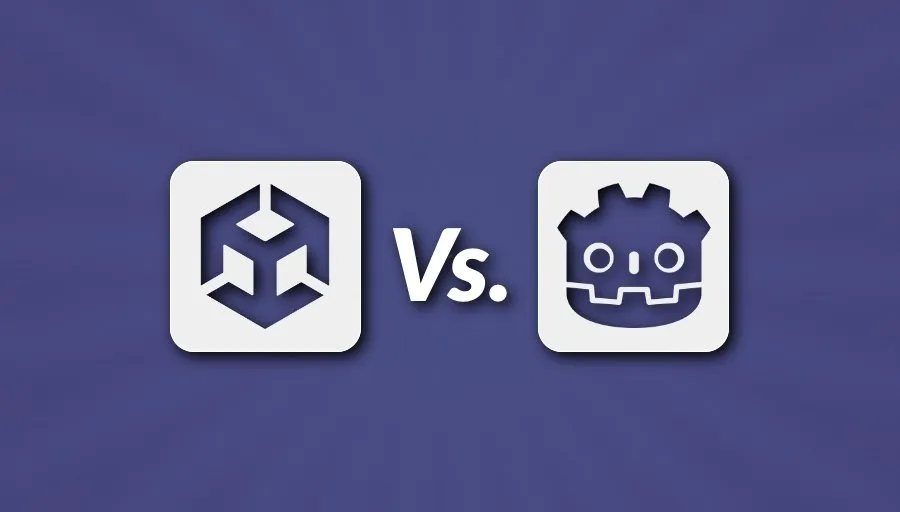

Comments
Great article!
One thing I didn’t see you mention is compatibility with lower spec computers. Unity can run like a slug on some older hardware while Godot is much faster. Might not be as relevant considering most people have decent computers but just wanted to mention that.
Thanks, that’s what I was looking for
Thanks for the article. I’ve been trying both engines, and they’re both great, still Unity just feels more mature, but in my case running Unity in Ubuntu via the Unity hub is buggy and a bit slow, while Godot runs smooth.
Nice article! Personally I wouldn’t touch unity for 2d projects generally, it’s a very heavy and resource hungry engine, I understand that it is feature rich but it’s an overkill most of the times for such games and there are more lightweight options currently out there. Godot sounds good also.
Something to take into consideration is that Unity is based on an old and “isolated” Monogame version. This is relevant in that the fundamentals are not as smooth and matured as Godot; this is added to the lack of full control you get at Godot. A good example of this is vague accessibility to DataBases (a feature that personally I’m willing to have freely and fully supported).
“Unity provides features that allow 2D development using what is, essentially, a 3D engine.” … I’m not sure if that is still relevant since URP has a dedicated 2D renderer. It was true for the default renderer.
Excellent article. Though for me, the answer isn’t even close. 100% Godot, at least for things other than games. I had been working on a project using Unity for about 2 years (in my spare time). When they recently changed the licensing model I took a look at Godot. Everything is so much easier. It may be that since I do a fair amount of Python programming and GDS is based on Python and Lua, the way things work just make more sense to me, but for whatever reason, I’m having a much easier time recreating my project. As a “so much easier” example, today I was able to quickly get multiple windows working. So far it’s just hovering over an object in the main window and info about that object is displayed in another, but it unlocks a lot of functionality for me.